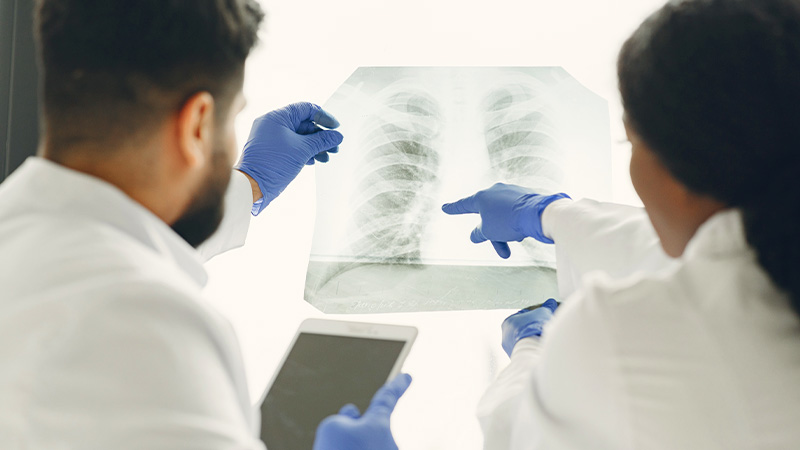Overview
At Parvathy Hospital, we believe breathing shouldn't be a struggle. Our dedicated team of pulmonologists is committed to providing comprehensive and compassionate care for the full spectrum of respiratory conditions. We employ cutting-edge technology and evidence-based practices to diagnose and manage your illness, empowering you to take control of your lung health and enjoy a vibrant life.
Common Problems We Address
- Asthma: Wheezing, shortness of breath, and chest tightness caused by airway inflammation.
- Chronic obstructive pulmonary disease (COPD): Difficulty breathing due to emphysema, chronic bronchitis, or other lung conditions.
- Interstitial lung disease (ILD): Scarring and inflammation within the lungs that impair oxygen exchange.
- Pneumonia: Bacterial, viral, or fungal infection of the lungs causing fever, cough, and difficulty breathing.
- Pulmonary embolisms: Blood clots in the lungs causing chest pain and shortness of breath.
- Tuberculosis: Bacterial infection of the lungs requiring targeted treatment.
- Other respiratory conditions: We treat a wide range of respiratory issues, including allergies, sinusitis, and lung infections.
Common Symptoms We Treat
- Difficulty breathing or shortness of breath
- Wheezing, coughing, or chest tightness
- Chronic cough or persistent phlegm
- Fatigue, weakness, or weight loss
- Chest pain or discomfort
- Fever, chills, or sweats
- Sleep disturbances or snoring
- Anxiety or difficulty sleeping due to breathing problems
Treatment Options
We offer a personalized approach to treatment, tailoring a plan that fits your specific needs and condition. Our comprehensive range of options includes:
- Medications: Inhaled medications, bronchodilators, antibiotics, steroids, and other drugs to manage symptoms and control your condition.
- Oxygen therapy: Supplemental oxygen to improve breathing and blood oxygen levels.
- Nebulizer treatments: Delivery of medication directly to your lungs for targeted relief.
- Pulmonary rehabilitation: Exercises and education to improve your lung function, strength, and quality of life.
- Minimally invasive procedures: Bronchoscopy, lung biopsies, and other procedures for diagnosis and treatment.
- Advanced pulmonary therapies: Depending on your condition, we may offer newer treatment options like lung transplantation or interventional pulmonology techniques.
When to Consult a Doctor ?
Don't wait for your symptoms to worsen. If you experience any persistent respiratory issues, it's crucial to seek expert advice. Consult a pulmonologist if you have:
- Any of the common symptoms listed above that last for more than a few days.
- Difficulty breathing that interferes with your daily activities.
- Chest pain or discomfort that worsens with breathing or movement.
- Unexplained fatigue or weight loss.
- Suspected exposure to lung irritants or environmental toxins.
- Concerns about sleep apnea or snoring.
Call +91 98412 98412 for medical emergencies or 044 2238 2248 / +91 98848 99091 to book an appointment.
General (FAQ) For Pulmonology
Body contouring includes surgical and non-surgical procedures designed to reshape and enhance the body is contours. It can involve procedures like liposuction, tummy tucks, and body lifts to address excess fat and sagging skin
Asthma is primarily caused by a combination of genetic and environmental factors. Triggers may include allergens (pollen, dust mites), respiratory infections, physical activity, air pollution, and exposure to certain irritants or substances.
Asthma treatment typically involves long-term control with inhaled corticosteroids, bronchodilators, and leukotriene modifiers. Short-acting bronchodilators are used for immediate relief during attacks. It is essential to work with a healthcare professional, such as a pulmonologist, to create a personalized asthma management plan.
While asthma is a chronic condition, proper management and treatment, often guided by a pulmonologist, can significantly improve symptoms and quality of life. Many individuals with asthma lead normal, active lives with appropriate medical care.
Anxiety can trigger or worsen asthma symptoms in some individuals, but it does not directly cause asthma. Stress and anxiety may contribute to respiratory issues and exacerbate asthma symptoms in those already diagnosed. If you experience concerns, consider consulting a pulmonologist or a doctor near you.
Symptoms of Chronic Obstructive Pulmonary Disease (COPD), a condition often managed by pulmonologists, include chronic cough, shortness of breath, wheezing, and chest tightness. These symptoms progressively worsen over time.
With proper management, lifestyle changes, and medical care from a pulmonologist, individuals with COPD can lead fulfilling lives. Early detection and intervention, often by a pulmonologist near you, contribute to better outcomes.
Smoking is the leading cause of COPD. Long-term exposure to irritants like tobacco smoke, air pollution, and occupational dust or chemicals can damage the lungs and lead to COPD. If you suspect COPD, consider consulting a pulmonologist or a respiratory specialist.
The prognosis for interstitial lung disease (ILD), often managed by pulmonologists, varies. Some ILDs have a more rapid progression, while others progress slowly. Survival rates depend on the specific type of ILD and its severity. If you have concerns, consult a pulmonologist for guidance.
Treatment for Interstitial Lung Disease may include medications like corticosteroids, immunosuppressants, and antifibrotic drugs. Oxygen therapy, pulmonary rehabilitation, and consultations with a pulmonologist are often part of the comprehensive treatment plan.
Early signs of ILD include shortness of breath, a persistent dry cough, fatigue, and unexplained weight loss. As the disease progresses, symptoms may worsen, necessitating evaluation by a pulmonologist.
Pneumonia is generally categorized into four stages, often monitored by pulmonologists: consolidation, red hepatization, gray hepatization, and resolution. These stages represent the progression and resolution of lung inflammation.
Severe pneumonia may present with danger signs such as high fever, rapid breathing, chest pain, confusion, bluish lips or nails (indicating poor oxygenation), and difficulty breathing. If you experience these signs, consult a pulmonologist or seek medical attention.
Pulmonary embolism is typically caused by blood clots that travel to the lungs from deep veins in the legs (deep vein thrombosis). Other sources of emboli include fat, air, or amniotic fluid. If you suspect a pulmonary embolism, seek immediate medical attention, potentially from a pulmonologist or emergency services.
Early warning signs of pulmonary embolism include sudden shortness of breath, chest pain (often worse with deep breaths), rapid heart rate, coughing up blood, and dizziness. If you experience these signs, seek prompt evaluation, possibly from a pulmonologist or emergency care.
Survival from a pulmonary embolism depends on factors such as the size of the clot, overall health, and prompt medical intervention. Timely treatment, often involving a pulmonologist, is crucial for favorable outcomes.
With appropriate treatment, blood thinners can prevent further clot formation, and the body may gradually break down the existing clot. However, complete resolution depends on various factors and requires medical guidance, potentially from a pulmonologist.
Yes, tuberculosis (TB) is curable with appropriate antibiotic treatment. Consult a healthcare professional, potentially a pulmonologist, for a comprehensive treatment plan.
TB is primarily spread through the air when an infected person coughs or sneezes. While it can spread easily in crowded or enclosed settings, close and prolonged contact is usually required for transmission. If concerned about TB, consider consulting a pulmonologist or infectious disease specialist.
With effective treatment, most TB patients can recover fully and lead a normal life. The key is early diagnosis, adherence to the prescribed medication regimen, and regular follow-up with a healthcare professional, potentially a pulmonologist.
Mycobacterium tuberculosis bacteria cause tuberculosis. It is primarily spread through airborne droplets when an infected person with active TB disease coughs or sneezes. If you suspect TB, seek evaluation and guidance from a healthcare professional, potentially a pulmonologist.















